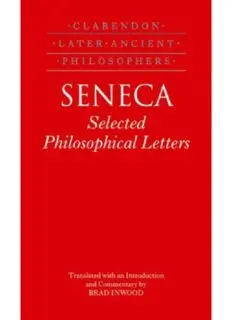Table Of ContentCLARENDON LATER ANCIENT
PHILOSOPHERS
Serieseditors:JonathanBarnes,Universite´deParisIV—Sorbonne
andA.A.Long,UniversityofCalifornia,Berkeley
SENECA
SELECTED PHILOSOPHICAL LETTERS
Seneca’s Letters to Lucilius are a rich source of information about
ancientStoicism,aninfluentialworkforearlymodernphilosophers,and
a fascinating philosophical document in their own right. This selection
of the letters aims to include those which are of greatest philosophical
interest, especially those which highlight the debates between Stoics
and Platonists or Aristotelians in the first century AD, and the issue,
still important today, of how technical philosophical enquiry is related
to the various purposes for which philosophy is practised. In addition
to examining the philosophical content of each letter, Brad Inwood’s
commentarydiscussestheliteraryandhistoricalbackgroundoftheletters
andtotheirrelationshipwithotherproseworksbySeneca.
Seneca is the earliest Stoic author for whom we have access to a large
number of complete works, and these works were highly influential in
latercenturies.HewasalsoapoliticallyinfluentialadvisortotheRoman
emperorNeroandacelebratedauthorofproseandverse.Hisphilosophical
acuityandindependenceofmindmakehisworksexcitingandchallenging
forthemodernreader.
Brad Inwoodis Professorof Classics and Philosophyat the University
ofToronto.
PUBLISHEDINTHESERIES
Alcinous:TheHandbookofPlatonism
JohnDillon
Epictetus:Discourses,Book
RobertDobbin
Galen:OntheTherapeuticMethod,BooksIandII
R.J.Hankinson
Porphyry:Introduction
JonathanBarnes
Seneca:SelectedPhilosophicalLetters
BradInwood
SextusEmpiricus:AgainsttheEthicists
RichardBett
SextusEmpiricus:AgainsttheGrammarians
DavidBlank
SENECA
SELECTED PHILOSOPHICAL LETTERS
Translatedwithan
IntroductionandCommentaryby
BRAD INWOOD
1
1
GreatClarendonStreet,Oxford
OxfordUniversityPressisadepartmentoftheUniversityofOxford.
ItfurtherstheUniversity’sobjectiveofexcellenceinresearch,scholarship,
andeducationbypublishingworldwidein
Oxford NewYork
Auckland CapeTown DaresSalaam HongKong Karachi
KualaLumpur Madrid Melbourne MexicoCity Nairobi
NewDelhi Shanghai Taipei Toronto
Withofficesin
Argentina Austria Brazil Chile CzechRepublic France Greece
Guatemala Hungary Italy Japan Poland Portugal Singapore
SouthKorea Switzerland Thailand Turkey Ukraine Vietnam
OxfordisaregisteredtrademarkofOxfordUniversityPress
intheUKandincertainothercountries
PublishedintheUnitedStates
byOxfordUniversityPressInc.,NewYork
BradInwood
Themoralrightsoftheauthorhavebeenasserted
DatabaserightOxfordUniversityPress(maker)
Firstpublished
Firstpublishedinpaperback
Allrightsreserved.Nopartofthispublicationmaybereproduced,
storedinaretrievalsystem,ortransmitted,inanyformorbyanymeans,
withoutthepriorpermissioninwritingofOxfordUniversityPress,
orasexpresslypermittedbylaw,orundertermsagreedwiththeappropriate
reprographicsrightsorganization.Enquiriesconcerningreproduction
outsidethescopeoftheaboveshouldbesenttotheRightsDepartment,
OxfordUniversityPress,attheaddressabove
Youmustnotcirculatethisbookinanyotherbindingorcover
andyoumustimposethesameconditiononanyacquirer
BritishLibraryCataloguinginPublicationData
Dataavailable
LibraryofCongressCataloginginPublicationData
Dataavailable
TypesetbyLaserwordsPrivateLimited,Chennai,India
PrintedinGreatBritain
onacid-freepaperby
CPIAntonyRowe,Chippenham,Wiltshire
ISBN––––(hbk)
––––(pbk)
Formyparents
PREFACE
InthecourseofmyworkonthisbookIhaveincurredmoredebtsthanIcan
fullyrecall,letaloneacknowledgehere.Itisagenuinepleasuretothank,
first and foremost, the Centre for Advanced Study in the Behavioural
Sciences for their supportduringa sabbatical leave in –. Without
the respite and stimulus provided by that unique institution this book
wouldneverhavebeencompleted.IamalsoverygratefultotheCanada
ResearchChairprogramoftheCanadiangovernmentandtomyfriends
andcolleaguesattheUniversityofTorontoforinvaluableandunstinting
support.Ioweagreatdealtothegenerousandcarefulworkofmyresearch
assistantsintheDepartmentofClassics,VickiCiocaniandEmilyFletcher.
MyinitialworkonSeneca’sletterswasencouragedbyaninvitationfrom
theancientphilosophygroupatCambridgeUniversitytoaworkshopon
Seneca’slettersinMay.Thediscussionatthatworkshopcontributed
a great dealto several of thecommentariesin thisbook.Later,students
in two of my graduate seminars (in and ) at the University
of Toronto served as willing guinea pigs and ingenious collaborators. A
keengroupofgraduatestudentsatNewYorkUniversityprovidedhelpful
feedbackonseverallettersduringaseriesofvisitsin;Iamgrateful
toPhillipMitsisfortheinvitationtoNYUandforhisencouragementand
adviceonSenecaovermanyyears.TonyLonghasbeenbothsupportive
ofandpatientaboutthisprojectforaverylongtime.Hisacutecomments
and thoseof hisfellow series editorJonathanBarnes haveimprovedthe
commentaryandtranslationatmanypoints;nodoubtIshouldhavetaken
their advice more consistently. David Sedley’s work on the relationship
between Stoic physics and ethics in Seneca’s work (especially in his
article ‘Stoic Metaphysics at Rome’, Sedley ) has been a valuable
source of stimulus. The need to respond to John Cooper’s challenging
discussion ‘Moral Theory and Moral Improvement: Seneca’ (Cooper
) provoked many fruitful lines of enquiry. The ancient philosophy
group at the University of Chicago has done a great deal for the study
of Seneca during the time when this book was under construction (not
leastbyorganizingakeyconferenceinApril)andtheirconfidencein
thevalueofSenecanstudiesinacontemporaryphilosophicalsettinghas
fosteredagreatdealofworkbymanypeoplefromwhichIhavebeenable
tobenefit.
viii
Some commentaries have benefitted from work on papers originally
written for oral presentation and since published separately. The com-
mentary on Letter is intimately connected to a paper given at the
UniversitiesofBuffalo,BritishColumbia,andAlberta,‘Reason,Ration-
alization and Happiness’; it now appears as chapter of Reading Seneca
(Inwood ). The commentary on Letter began as a sketch for
‘Getting to Goodness’, delivered to the Princeton Ancient Philosophy
Colloquium and at the University of Pittsburgh and now published as
chapter of Reading Seneca. The commentary on Letter has been
enriched by discussion of an unpublished paper presented at Cornell
University,theUniversityofArizona,andUCSantaBarbara.
IoweaparticularlyconcretedebtofgratitudetoMargaretGraver,who
subjectedthepenultimatedraftofmytranslationtoanexactingscrutiny.
HerinfluencehassavedmefrommanyerrorsandinfelicitiesandIhave
oftenacceptedhersuggestionsforbetterwording;theremainingblunders
aremyownfault.Margaretalsoreadanearlyversionofthecommentaries
with a critical eye; her comments and suggestions have improved my
commentonalmosteveryletter.
Itisnomerecliche´tosaythatwithouttheencouragement,advice,and
lovingsupportofmywife,Niko Scharer,I wouldnothavebeen ableto
writethisbook.Anevenolderdebtisowedtomyparents,MargandBill
Inwood. For many decades they have provided a wonderful education,
bothmoralandintellectual.MybrothersandIhadtheprivilegeofgrowing
upinahouseholdwherecriticalenquiry,teaching,intellectualchallenge,
andapassionforfairnesswereinthefabricofdailylife.Ithastakenme
a long time to see how precious a gift our parents gave us. Humbly, I
dedicatethisbooktothem.
CONTENTS
Introduction xi
AbbreviationsandConventions xxv
TRANSLATIONS 1
Letter
Letter
Letter
Letter
Letter
Letter
Letter
Letter
Letter
Letter
Letter
Letter
Letter
Letter
Letter
Letter
Letter
COMMENTARY 105
Group(Letters,,)
Letter
Letter
Letter

